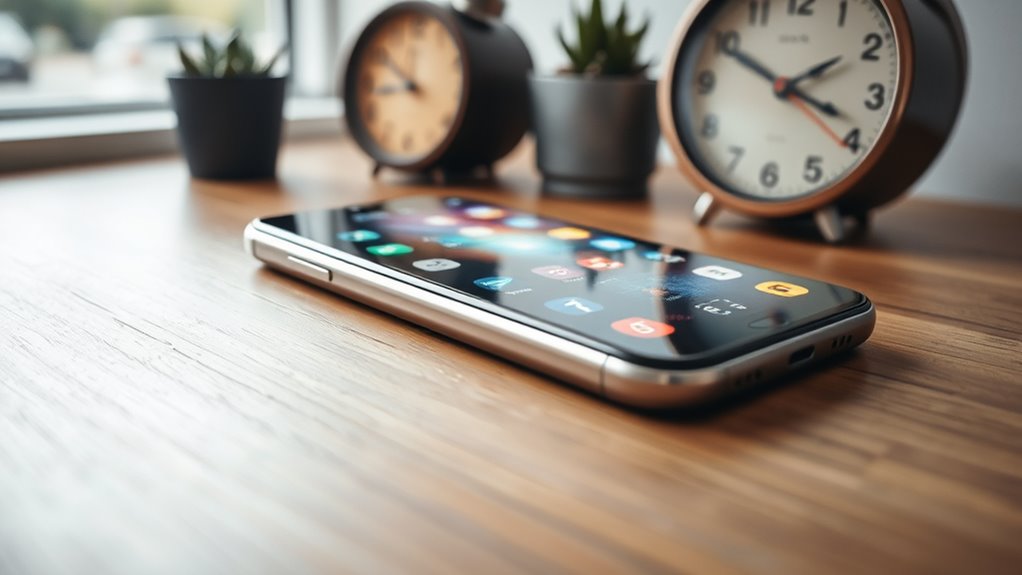Many common battery myths, like fully discharging or charging to 100%, don’t actually help extend your device’s lifespan. Instead, focus on keeping your battery between 20% and 80%, use certified chargers, and avoid exposure to extreme heat. Modern batteries are designed to handle typical routines, so stressing over tiny percentages or unnecessary calibrations isn’t necessary. Stay practical and consistent for better battery health—more tips behind the next point may surprise you.
Key Takeaways
- Maintain battery charge levels between 20% and 80% for optimal lifespan.
- Use certified chargers and avoid low-quality cables to ensure safe, steady power flow.
- Keep your device in cool, temperature-controlled environments to prevent heat-related capacity loss.
- Modern batteries do not require frequent calibration; focus on consistent charging habits instead.
- Avoid unnecessary rituals or extreme discharge cycles; simple, regular care best preserves battery health.

Have you ever wondered if the common advice about extending your device’s battery life is actually true? Many people believe that performing a battery calibration or adopting certain charging habits can notably prolong the lifespan of their batteries. While these tips aren’t entirely without merit, understanding the facts helps you avoid wasting time on myths. Battery calibration, for instance, involves fully draining and then fully recharging your device to recalibrate the battery indicator. Some think this resets the battery’s internal measurement and improves accuracy, but in reality, modern batteries and devices rarely need calibration. Most manufacturers design their batteries to self-calibrate over time, so doing it frequently isn’t necessary and won’t necessarily extend your battery’s overall life.
When it comes to charging habits, many believe that keeping your device plugged in at 100% or letting it die completely will harm the battery. The truth is, today’s lithium-ion batteries are more resilient than older types. While consistently charging to 100% or letting the battery drain completely can cause some wear over time, occasional full charges or discharges aren’t likely to cause notable damage. What matters more is your overall charging pattern. For example, keeping your battery between roughly 20% and 80% can help reduce stress and slow capacity loss. Avoiding extreme charge levels frequently is a practical way to extend your battery’s health, but obsessing over tiny percentage fluctuations isn’t necessary. Also, constantly charging your device overnight isn’t inherently harmful, as many modern phones and laptops have built-in protections to prevent overcharging. It’s more about your general habits rather than strict rules.
You might also hear that using third-party chargers or cheap cables can damage your battery, which isn’t entirely false. Low-quality accessories may not regulate power properly, causing irregular charging that can degrade the battery faster. Investing in certified chargers ensures a steady, safe current flow, helping preserve your device’s longevity. It’s equally important to avoid exposing your device to extreme temperatures, as heat accelerates battery aging, regardless of your charging routine. Additionally, understanding the contrast ratio of your display can help you optimize your device’s power consumption by adjusting settings for better efficiency.
In essence, the most effective ways to extend your device’s battery lifespan aren’t rooted in complicated rituals or outdated advice. Focus on maintaining moderate charge levels, use quality charging accessories, and keep your device in a cool environment. Don’t waste time on unnecessary calibration or rigid charging schedules—your device’s battery will thank you for simple, consistent care.
Frequently Asked Questions
Can Leaving My Device Plugged in Constantly Damage the Battery?
Leaving your device plugged in constantly doesn’t usually damage the battery, but it can affect battery capacity over time. Modern batteries manage charging cycles and stop charging once full, preventing overcharging. However, keeping your device plugged in for long periods may still lead to slight capacity loss, especially if it heats up. To preserve battery health, it’s best to unplug once it’s fully charged and avoid constantly charging.
Is It Better to Fully Charge or Fully Discharge My Battery Regularly?
You should aim for balanced charging habits rather than fully charging or discharging your battery regularly. Lithium-ion batteries perform best with partial discharging cycles and keeping the charge between 20% and 80%. Fully discharging your battery can strain it, while always charging to 100% may reduce lifespan. Focus on maintaining moderate charging habits to prolong your device’s battery health and overall lifespan.
Do Low-Power Modes Significantly Extend Battery Lifespan?
You wonder if low-power modes really help extend your battery lifespan. They do, by activating power saving features that reduce background activity and optimize battery use. While they won’t dramatically increase battery health long-term, they’re effective for conserving energy when needed. Using these modes regularly helps your device run longer between charges and supports overall battery optimization, keeping your device functioning efficiently over time.
How Does Temperature Affect My Device’S Battery Health Long-Term?
You might think high temperatures boost your device’s performance, but they actually harm your battery’s health long-term. Thermal regulation is essential because excessive heat accelerates battery degradation, shortening its lifespan. Conversely, keeping your device cool helps maintain ideal battery function. Avoid exposing your device to extreme heat, and don’t leave it in hot environments. Proper thermal regulation is vital to preserving your battery’s capacity and ensuring it lasts longer.
Are There Specific Apps That Drain Battery Faster Over Time?
You might notice some apps causing more battery drain over time, especially if they run background processes or use location services excessively. To combat this, you should focus on app optimization—close or uninstall apps that drain battery unnecessarily. Keep your apps updated, as developers often improve efficiency. Monitoring app battery drain helps you identify and manage power-hungry apps, ensuring your device lasts longer between charges.
Conclusion
Don’t let myths hold you back from caring for your device. While chasing perfect battery life might seem urgent, neglecting proper habits can lead to faster deterioration. Think of your device like a cherished companion—you wouldn’t ignore its needs. By debunking myths and adopting simple, effective habits, you’ll extend its lifespan and preserve those precious moments. In the end, caring for your device isn’t just about tech; it’s about valuing what keeps you connected every day.









